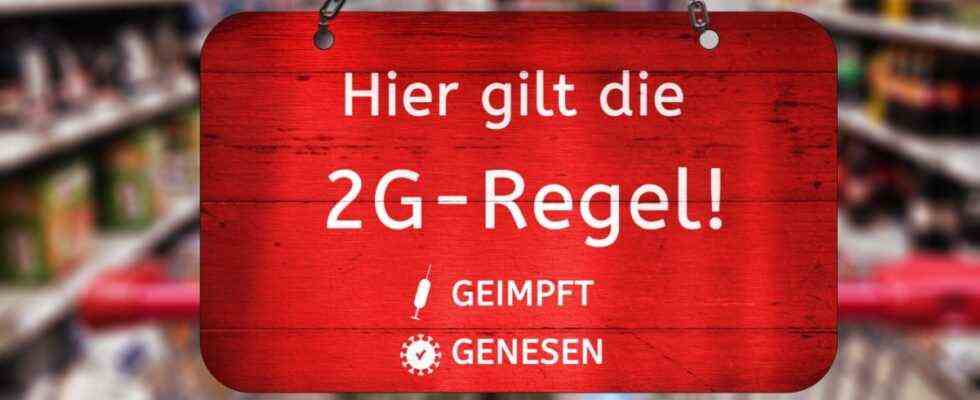In Bavarian retail there is “no joy and jubilation” after the third weekend in Advent, said Bernd Ohlmann, spokesman for the Bavarian Trade Association. The hope that customers would feel more secure with the recently introduced 2-G rule has not been confirmed. Many business people had expected that the vaccinated and convalescents would come more often if the unvaccinated are not allowed in the shops. But that was not the case, rather the opposite. According to Ohlmann, in addition to the non-vaccinated and those who continue to be anxious, there were those who say: “I don’t allow myself to be checked if I want to go into a shop.”
The third sales Saturday in Advent went even worse than last year – the lockdown only began after that. The retail trade in the Free State is therefore “light years away” from the festive mood. In stationary retail in particular, where 2G is required, things are going badly after the experience of the past few days: “Many shops have 40 to 60 percent fewer customers,” said the spokesman for the trade association. “The Christmas business is bobbing around in Munich, too, with no juice or power.” Instead, sales migrated to the Internet: “2G is a mega-turbo accelerator.” Most of it goes to the big online retailers, but even retailers with a good online shop can make up for some of the lost sales in the store. “Overall, there will be no fewer gifts under the Christmas tree than in previous years,” believes Ohlmann. But especially for small shops without an online offer, it will be “tight”: “Many are facing the abyss. Some are considering closing immediately and relying on Corona aid from the state.” The Christmas business accounts for an average of more than 20 percent of annual sales in retail, 40 percent for toys and even more for jewelers.
“There was hardly any grumbling.”
Even if the first weekend in Advent with the 2-G rule was disappointing, there is also a positive aspect: the customers were mostly “very disciplined” with the 2-G controls, emphasized Ohlmann. “There was hardly any grumbling.” But of course shopping is not really fun with it. Uwe H. Werner, district manager of the Mittelfranken trade association, has also observed that most customers tolerate the 2-G rule: “But the check lines in front of the shops are of course not conducive to the shopping experience.” In Nuremberg, sales fell short of the already low expectations.
To make the controls easier, some cities wanted to use wristbands, as in other federal states. The 2-G status of customers is checked once when they enter a shop or restaurant. As at a music festival, the customer is given a ribbon on his wrist that is supposed to allow him access to other shops without further control. However, this could not be implemented in all cases. While ribbons were being given out to customers in Bamberg, the project in Kempten was stopped at short notice. The Bavarian Ministry of Health “rated the project as not permissible,” said City Management Kempten on Friday.
Ribbons prohibited – not forgery-proof
In a letter to the district administrative authorities, which the Bavarian Trade Association refers to on its homepage, it says that the ribbon does not comply with the 15th Bavarian Infection Protection Ordinance, which states that every facility to which the 2-G rule applies, it also does must be controlled. With the ribbon model, only the presence of a ribbon would be checked, but not vaccination status and identity. Using a ribbon to trust that the verification of the vaccination certificate and the identity had already been carried out elsewhere, could not be considered sufficient. In addition, the ribbons are not “forgery-proof”. For those affected it was disappointing, said trade association spokesman Ohlmann: “It would have been a relief, but not a breakthrough.” From an economic point of view, the business owners can only hope for the fourth weekend in Advent and the last working days before Christmas, according to Ohlmann.
Since Wednesday, only vaccinated and convalescent people have been allowed to shop in parts of the retail trade in Bavaria. However, the 2-G rule does not apply to everyday shops. The Ministry of Health not only includes grocery stores, pharmacies, drugstores, petrol stations, hardware stores and newsagents, but also opticians, acousticians, baby stores, animal and feed stores, flower shops, shoe shops and bookstores – as well as craft shops and workshops. Clothing and sports stores as well as jewelers are affected by the 2-G rule.

